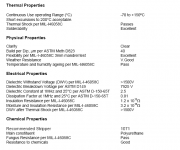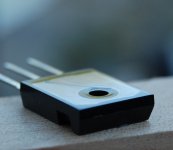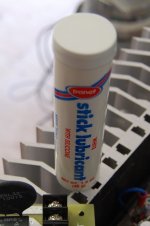I think I tried long enough to make it clear so I'll follow W.C. Fields' advise and quit.
Nope, you didn't even try once.
What do you mean when you say "organic?" No answer.
Can you quantify or back up the claim that "air" in whatever dielectric you care to class as "hygroscopic" (maybe that means something different when you use it, too) carries anything close to the amount of moisture taken up by the "organic" dielectric? Nope, you didn't even try to answer that, either. That's a claim of physical fact; it makes no sense to me, maybe I'm missing something, so I'm asking you, pretty please, to tell me what's behind that claim?
On the topic of dielectrics I did some crude tests last winter, looking for an easier/more effective insulator to replace mica on flat package transistors (yeah, no life). I thought about painting the back plate with something and I eventually tried waterbased polyurethane, thinking this could be applied thin, is tough and (I assumed) is a good insulator. The problem I had was applying it smoothly enough, as it dries very quickly it doesn't "flow out" like it's solvent based cousin. I gave up on the idea then, distracted by other things.
Thinking about it since, I have come up with another way - this time I will dip the whole device and let the coating drip off.
What do you suppose the dielectric strength of waterbased polyurethane is and how does it compare with mica or silicone?
Since none of the "technical" guys here provided any help and this thread has further degenerated to bickering about word definitions, I did some searching on my own and found the electrical and thermal properties of the coating I want to try. See attached specs.
I have cleaned and dipped an MJW21196 and will let it cure for a few days before I test it.
Attachments
Another useful "dipping" material is Dolph AC41. Tis an air dry only, 100% solids with a Dade County Fla class one rating for fungus rejection. Same dielectric constant. You can get quart samples most of the time through EIS, who also supply most of the dielectric materials and electrical tape to the hidden world of transformer manufacture. To bad you didn't come and tip me out of my comfort zone John, I would have been proud to lead you astray......
Polyurethane is an excellent material. You may want to consider a double dip, just to be certain you have covered any bubbles.
Bud
Polyurethane is an excellent material. You may want to consider a double dip, just to be certain you have covered any bubbles.
Bud
Hmm, screwed up my last edit, sorry. John, PUR has nice physical properties but lousy thermal conductivity and mediocre heat stability. Silicone (a two part, Pt-catalyzed) loaded with metal oxide is your best bet here.
Thanks Bud,
I want to try one dip first to see how that hold up. My test will be to check for high voltage continuity from the back plate to the heatsink while I heat up the heatsink. Further tests (if it passes that one) would be for thermal conductivity using a class A amp.
I'm just playing here with the things I have. It occurred to me it may work so to satisfy my curiosity I'll try it.
Thanks SY,
The thermal conductivity will be improved by it being extremely thin. I want to test for stability, especially with the thermal compound I'm using (cheap stick lubricant with silicone and paraffin - found in any hardware store for <$5. See attached pic. My 6 channel amp has been running continuously for several months using this lube and mica insulators on all devices). We will see.
Here's the device, 30 minutes after coating:
I want to try one dip first to see how that hold up. My test will be to check for high voltage continuity from the back plate to the heatsink while I heat up the heatsink. Further tests (if it passes that one) would be for thermal conductivity using a class A amp.
I'm just playing here with the things I have. It occurred to me it may work so to satisfy my curiosity I'll try it.
Thanks SY,
The thermal conductivity will be improved by it being extremely thin. I want to test for stability, especially with the thermal compound I'm using (cheap stick lubricant with silicone and paraffin - found in any hardware store for <$5. See attached pic. My 6 channel amp has been running continuously for several months using this lube and mica insulators on all devices). We will see.
Here's the device, 30 minutes after coating:
Attachments
Hi,
There's an old Flemish saying that goes as follows:
Wat helpen kaars en bril als den uyl niet zienen wil.
Several posters besides me try to point you in the right direction but no, you must insist.
It's a shame to have such a limited view.
Moreover, you as a moderator, should respect the spirit of the TS but your ego is just taking over, isn't it?
Intelligence is not about sticking to what's been forcefed as fact but to inquire what about it is actually true.
So, what's your hidden agenda?
To get me so angry and upset about your obnoxious behaviour so I'll raise hell at this forum's board or are you finally going to accept that there possibly are several meanings to a single word?
And yes, Bas is probably knocking his brains out in disbelief....
What bit you, Sy?
Be ware that I'm writing this in all respect. From the tone of the exchanges however I sense something isn't quite kosher though.
Only trying to help, 😉
Nope, you didn't even try once.
What do you mean when you say "organic?" No answer.
Can you quantify or back up the claim that "air" in whatever dielectric you care to class as "hygroscopic" (maybe that means something different when you use it, too) carries anything close to the amount of moisture taken up by the "organic" dielectric? Nope, you didn't even try to answer that, either. That's a claim of physical fact; it makes no sense to me, maybe I'm missing something, so I'm asking you, pretty please, to tell me what's behind that claim?
There's an old Flemish saying that goes as follows:
Wat helpen kaars en bril als den uyl niet zienen wil.
Several posters besides me try to point you in the right direction but no, you must insist.
It's a shame to have such a limited view.
Moreover, you as a moderator, should respect the spirit of the TS but your ego is just taking over, isn't it?
Intelligence is not about sticking to what's been forcefed as fact but to inquire what about it is actually true.
So, what's your hidden agenda?
To get me so angry and upset about your obnoxious behaviour so I'll raise hell at this forum's board or are you finally going to accept that there possibly are several meanings to a single word?
And yes, Bas is probably knocking his brains out in disbelief....
What bit you, Sy?
Be ware that I'm writing this in all respect. From the tone of the exchanges however I sense something isn't quite kosher though.
Only trying to help, 😉
Last edited:
If the message is, "I reserve the right to say things which appear incorrect, then refuse to back them up," then yes, loud and clear.
What was this polyurethane coating originally designed for? The specs look perfect for IC insulation.Since none of the "technical" guys here provided any help and this thread has further degenerated to bickering about word definitions, I did some searching on my own and found the electrical and thermal properties of the coating I want to try. See attached specs.
I have cleaned and dipped an MJW21196 and will let it cure for a few days before I test it.
Hi,
It only appears to be incorrect to you.
You really can't be bothered to read the initial posts by the TS, can you?
I know, reading implies the understanding of words within a given context.
Not always easy for someone with a restricted filological capacity....
It's not as if you're answering any of my questions either mister "I think I'm so smart"
Cheers, 😉
It only appears to be incorrect to you.
You really can't be bothered to read the initial posts by the TS, can you?
I know, reading implies the understanding of words within a given context.
Not always easy for someone with a restricted filological capacity....
It's not as if you're answering any of my questions either mister "I think I'm so smart"
Cheers, 😉
Hi 454,
It's clear waterbased polyurethane - Varathane Diamond brand for floors - refinished my living room and dining room white oak floors a couple months back.
It's clear waterbased polyurethane - Varathane Diamond brand for floors - refinished my living room and dining room white oak floors a couple months back.
It's not as if you're answering any of my questions either mister "I think I'm so smart"
I thought they were rhetorical. Apparently not, so here goes.
So, what's your hidden agenda?
None whatever. Unlike you, I don't make money from this stuff.
What bit you, Sy?
Fire ants. They're common here in Texas.
OK, so now please answer mine:
1. What in the world do you mean by "organic" dielectric? What's the criterion for something being organic versus inorganic?
2. Can you please provide some backup for your remarkable statement about the hygroscopic qualities of air versus cellulose?
Hi SY, I think the point Frank is trying to make is that outside of the rigid definition of organic from organic chemistry (Something that only a fairly small percentage of the population would even be aware of) There are many other (mis)uses of the word Organic. Probably the one that the majority of the population would use would be that organic matter is that which has grown (be it animal or vegetable). Yes Oil is made up of what was was once living organisms, and plastics are derived from oil, but I think that the generally held belief is that organic means something naturally occuring as opposed to synthetic (ie systhesised from something else which may or may not have been naturally occuring in the first place).
For example I think that although silk and cotton may undergo a number of chemical processes in their manufacture (I won't even go near paper, because you are correct paper is not naturally occuring), they are for all intents and purposes naturally occuring substances. However I think you would be hard pressed to find some naturally occurring polypropylene 😉
Tony.
For example I think that although silk and cotton may undergo a number of chemical processes in their manufacture (I won't even go near paper, because you are correct paper is not naturally occuring), they are for all intents and purposes naturally occuring substances. However I think you would be hard pressed to find some naturally occurring polypropylene 😉
Tony.
Maybe. I don't know. Frank has used the word in a very nonstandard way and won't really say what he means. Being vague provides safety for vague ideas.
In any case, polypropylene doesn't undergo any more reaction than paper, possibly less, so I don't get that definition, either. Cotton takes a similar amount of processing and resembles the original material not at all- I don't know about silk. Mineral oil is routinely used in caps, it's also organic. Would synthesized vitamin C be "organic?" Polylactic acid?
Yeah, vague is safe. No need to provide evidence or explanation that could hurt business.
In any case, polypropylene doesn't undergo any more reaction than paper, possibly less, so I don't get that definition, either. Cotton takes a similar amount of processing and resembles the original material not at all- I don't know about silk. Mineral oil is routinely used in caps, it's also organic. Would synthesized vitamin C be "organic?" Polylactic acid?
Yeah, vague is safe. No need to provide evidence or explanation that could hurt business.
Hi,
What on earth makes you think I do?
Shall I send you a copy of my resume?
A sad yet very humane story indeed, if any.
Are your going to get rid of those prejudices of yours just by me saying so?
I've been noticing innuendo about me peddling stuff etc. but you're so wrong it's beyond belief.
Quite frankly, after all the help I've offered for free to audiophiles or whomever took an interest in music and showed up at my doorstep, I find your unbased accusations rather offensive.
As a matter of fact, I've helped people with their projects from around the globe.
Guess the next thing the junta is going to accuse me of is socialism?
Of being good natured and kind? Is it a crime to NOT pursue money or are your words being a mere paradox?
You can because you're empowered to do so but no one else can?
As a matter of fact, I sacrificed much of my company just to help others out.
Silly me, I could have made a fortune by not investing time and effort.
Organic growth, you know...Guess not.
You're so misinformed it's beyond belief but that still shouldn't be any justification for your hostile behaviour.
Am I the moron here or what?
Don't take your members for granted, SY, you and everyone have to deserve them.
Lately, you don't deserve me for a minute.😛
Ciao, monsieur le fascho, 😉
** Guess this is going to go to the cleaners illico presto. I keep records though.🙂 Look in the mirror first.
HTML:
So, what's your hidden agenda?
None whatever. Unlike you, I don't make money from this stuff.What on earth makes you think I do?
Shall I send you a copy of my resume?
A sad yet very humane story indeed, if any.
Are your going to get rid of those prejudices of yours just by me saying so?
I've been noticing innuendo about me peddling stuff etc. but you're so wrong it's beyond belief.
Quite frankly, after all the help I've offered for free to audiophiles or whomever took an interest in music and showed up at my doorstep, I find your unbased accusations rather offensive.
As a matter of fact, I've helped people with their projects from around the globe.
Guess the next thing the junta is going to accuse me of is socialism?
Of being good natured and kind? Is it a crime to NOT pursue money or are your words being a mere paradox?
You can because you're empowered to do so but no one else can?
As a matter of fact, I sacrificed much of my company just to help others out.
Silly me, I could have made a fortune by not investing time and effort.
Organic growth, you know...Guess not.
You're so misinformed it's beyond belief but that still shouldn't be any justification for your hostile behaviour.
Am I the moron here or what?
Don't take your members for granted, SY, you and everyone have to deserve them.
Lately, you don't deserve me for a minute.😛
Ciao, monsieur le fascho, 😉
** Guess this is going to go to the cleaners illico presto. I keep records though.🙂 Look in the mirror first.
Hi,
Oh, yeah, blame people for being literate while you're at it.
Gosh, get a grip and let the sour grapes be. Don't take it out on us, will you?
Small people, 😱
Maybe. I don't know. Frank has used the word in a very nonstandard way and won't really say what he means. Being vague provides safety for vague ideas.
Oh, yeah, blame people for being literate while you're at it.
Gosh, get a grip and let the sour grapes be. Don't take it out on us, will you?
Small people, 😱
So with this latest set of insults, still with no actual answer, I take it you don't know actually know what "organic" means and you have no backup to your fact claim about the hygroscopic nature of cotton or paper?
- Status
- Not open for further replies.
- Home
- Design & Build
- Parts
- Natural dielectrics (in caps and wire) like silk, paper and cotton sound more natural


